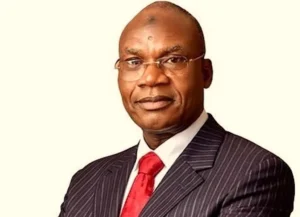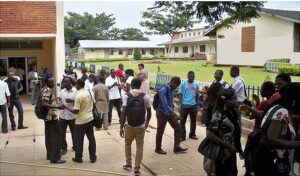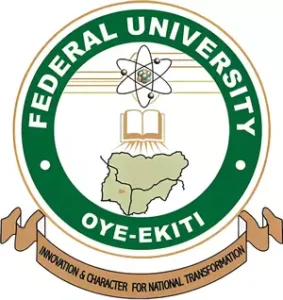By Princess G. Fraser. MFR.
The National Patriots.
Education — the soul of any nation’s development — is fast slipping beyond the reach of the average Nigerian. The recently released tuition structures from leading federal institutions — University of Ilorin (UNILORIN) and Federal University, Oye Ekiti (FUOYE) — have sparked widespread concern among parents, students, and education advocates nationwide.

For the 2025/2026 academic session, tuition fees at UNILORIN now range from ₦234,000 to ₦406,000, depending on the department. Courses like Pharmacy attract ₦406,888, Medicine (MBBS) ₦389,000, Nursing ₦346,000, and even humanities courses like Political Science and Psychology now hover around ₦235,000.
At FUOYE, newly admitted students face an even heavier burden. Acceptance and processing fees exceed ₦100,000, while medical registration and departmental costs raise total expenses to between ₦225,000 and ₦320,000, depending on the faculty.
When Education Becomes a Luxury
These figures mark a sharp departure from Nigeria’s past, when tertiary education in federal institutions was affordable and accessible. With a national minimum wage still at ₦30,000, a year’s tuition now equates to eight to twelve months of a household’s entire income — before food, rent, or transport are even considered.
Education, once the ladder of upward mobility, is now at risk of becoming a luxury for the privileged.
The Economic Context
Nigeria’s oil-dependent economy continues to suffer from currency volatility, inflation, and import dependency. Rising operational costs for universities — from laboratory chemicals to power and maintenance — have driven institutions to hike tuition fees.
But education is not a market commodity — it is a strategic national investment. Pricing students out of higher education undermines workforce development and perpetuates economic stagnation.
Global Lessons: Education as a Public Good
Country Tuition Policy Result
Germany Free public universities for all Highly skilled, innovative workforce
Finland 100% free tertiary education Top-ranked education system globally
India Subsidized and free technical institutions Rapid rise in technology and innovation
China Government-subsidized education since 1980s World’s largest skilled labor pool
Japan Tuition control & education grants Post-war economic powerhouse
Canada Capped tuition + robust student aid High tertiary enrollment rate
These countries recognized early that education is not expenditure — it’s nation-building. They subsidized learning to fuel innovation, productivity, and resilience.
Nigeria’s Missed Opportunity — and Its Bright Spots

President Bola Ahmed Tinubu’s administration deserves credit for prioritizing education through:
Free tuition for vocational colleges,
The reformed Student Loan Act with instant online applications,
Renewed funding for technical and skill-based learning.
However, the reality on the ground is grim. University tuition inflation is far outpacing family income, and the current student loan provisions are no longer sufficient to meet the scale of need.
The amount available under the Student Loan Scheme must be reviewed upward to reflect current economic realities — rising fees, transport costs, and living expenses. Without such adjustment, the policy will fall short of its intended impact, offering hope on paper but not in practice.
Nigeria’s next generation of leaders cannot thrive on goodwill alone; they need accessible, affordable education backed by responsive policy.
Why Government Must Act Now
1. Education Fuels Economic Growth
UNESCO estimates that nations investing 4–6% of GDP in education experience long-term GDP growth and lower unemployment. Nigeria currently allocates less than 3% — far below global benchmarks.
2. Subsidy Savings Must Serve the Future
Post-subsidy savings can and should be redirected into education subsidies, ensuring that every Nigerian youth can afford to stay in school.
3. Social Stability Depends on Youth Inclusion
Excluding millions of students due to unaffordable fees risks unrest, migration pressures, and a decline in skilled labor.
4. Loans Without Adequate Coverage Create Inequality
If loan amounts fail to match real costs, only the wealthy will remain in classrooms — deepening the divide between privilege and potential.
The Way Forward
Peg University Fees: Set a government-approved maximum tuition rate for federal institutions.
Expand Subsidy Funding: Channel a portion of oil revenue savings directly into tuition assistance.
Review and Increase Student Loan Amounts: Make them commensurate with real living and academic costs in today’s economy.
Audit University Finances: Enforce transparency to justify any fee hikes.
Encourage Corporate Sponsorships: Offer tax incentives for private-sector scholarships and education endowments.

Education: The True National Security
Every nation that invested in human capital — from China to South Korea — rose from poverty to power. Nigeria, blessed with one of the youngest populations in the world, cannot afford to abandon its youth at the gates of learning.
The current trajectory, if unchecked, will widen inequality, weaken the middle class, and erode national competitiveness.
A Plea to the Authorities
Education is not a burden to subsidize — it is the foundation of every great nation.
By reviewing the student loan structure, subsidizing tertiary fees, and ensuring no Nigerian is denied access to education, the government can turn crisis into opportunity.
> “When you educate a nation, you secure its future. When you ignore its youth, you gamble with its destiny.”
Now is the time for bold, compassionate leadership — to turn policy into purpose and ensure that every Nigerian child, regardless of circumstance, can dream, learn, and build the nation they deserve.
Education must not be a privilege. It must remain the promise of every Nigerian child.
Princess G. Fraser. MFR
The National Patriots.

The University of Ilorin (UNILORIN) tuition fees for 100-level students for the 2025/2026 academic session have been confirmed so far by Honorable Updates.
The fees vary across departments as follows:
MBBS – ₦389,000; Agriculture – ₦278,888;
Anatomy – ₦296,000; Computer Science – ₦263,388; Biochemistry – ₦252,000;
Food Science – ₦284,888;
Medical Laboratory Science (MLS) – ₦326,084;
English Education – ₦234,064;
Yoruba – ₦259,064; Pharmacy – ₦406,888;
Optometry – ₦252,388; Microbiology – ₦252,388;
Marketing – ₦244,064; Geophysics – ₦249,000;
Linguistics – ₦259,064;
Plant Biology – ₦255,888; Physiotherapy – ₦326,084;
Health Education – ₦249,388;
Political Science – ₦235,000; Criminology – ₦239,000;
Nursing – ₦346,000; Common Law – ₦239,000;
Veterinary Medicine – ₦286,000; Mathematics – ₦251,000; Psychology – ₦239,000; and Sociology – ₦250,000.
This is a developing report. Stay tuned.

This is what Federal University, Oye Ekiti is demanding from parents
FUOYE FRESHERS’ FEES 2025/2026
FACULTY OF AGRICULTURE
– Clearance Processing Fee: ₦10,000
– Acceptance Fee: ₦80,000
– Medical Registration & Fitness Screening: ₦20,000
– Counselling Handbook: ₦2,000
– School/Sundry Fee: ₦190,000
– FUOYE Internet Distribution Service (FIDS): ₦20,000
FACULTY OF ARTS
– Clearance Processing Fee: ₦10,000
– Acceptance Fee: ₦80,000
– Medical Registration & Fitness Screening: ₦20,000
– Counselling Handbook: ₦2,000
– School/Sundry Fee: ₦190,000
– FUOYE Internet Distribution Service (FIDS): ₦20,000
FACULTY OF BASIC MEDICAL SCIENCES
– Clearance Processing Fee: ₦10,000
– Acceptance Fee: ₦100,000
– Medical Registration & Fitness Screening: ₦20,000
– Counselling Handbook: ₦2,000
– School/Sundry Fee:
I. Anatomy: ₦240,000
II. Physiology: ₦240,000
III. Medical Laboratory Science: ₦290,000
IV. Nursing Science: ₦290,000
Radiology & Radiation Science: ₦290,000
– FUOYE Internet Distribution Service (FIDS): ₦20,000
FACULTY OF COMMUNICATION AND MEDIA STUDIES
– Clearance Processing Fee: ₦10,000
– Acceptance Fee: ₦90,000
– Medical Registration & Fitness Screening: ₦20,000
– Counselling Handbook: ₦2,000
– School/Sundry Fee: ₦225,500
– FUOYE Internet Distribution Service (FIDS): ₦20,000
FACULTY OF COMPUTING AND INFORMATION ENGINEERING
– Clearance Processing Fee: ₦10,000
– Acceptance Fee: Not Specified
– Medical Registration & Fitness Screening: ₦20,000
– Counselling Handbook: ₦2,000
– School/Sundry Fee: ₦225,500
– FUOYE Internet Distribution Service (FIDS): ₦20,000
FACULTY OF EDUCATION
– Clearance Processing Fee: ₦10,000
– Acceptance Fee: ₦80,000
– Medical Registration & Fitness Screening: ₦20,000
– Counselling Handbook: ₦2,000
– School/Sundry Fee: ₦190,000
– FUOYE Internet Distribution Service (FIDS): ₦20,000




